Gateway NV58 (Intel) - OS Benchmarks
Wrapping up our look at OS performance on the NV58, we have our OS boot/shut down, hibernate/resume, and sleep/wake test results. As with the NV52, there was a fair amount of variability between test runs. We took the best result of numerous runs for each OS. Once more, note that Windows XP will have an advantage in the hibernate/resume testing because we are using a 32-bit OS (3GB addressable RAM) instead of a 64-bit OS (4GB addressable RAM). No OS wins - or loses - in every single category, but Windows XP and Win7 are usually near the top and Ubuntu and Vista are near the bottom.
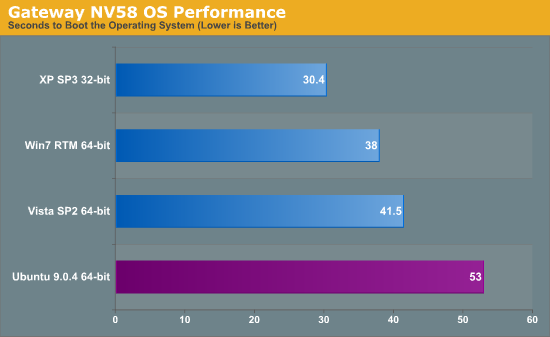
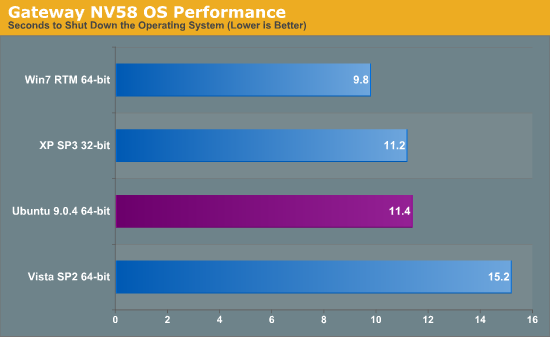
XP loads the fastest once again, this time leading the competition by a larger margin than on the NV52. Windows 7 takes 25% longer to boot, Vista takes 36% longer, and Ubuntu is in last at 74% longer than XP. The GRUB delay is a large portion of the poor showing for Ubuntu, though; it would be very close to the Vista result without the extra ~10 seconds. Shut down times new Windows 7 into the lead, with XP and Ubuntu essentially tied at around 15% longer than Vista bringing up the rear taking 55% longer than Win7.
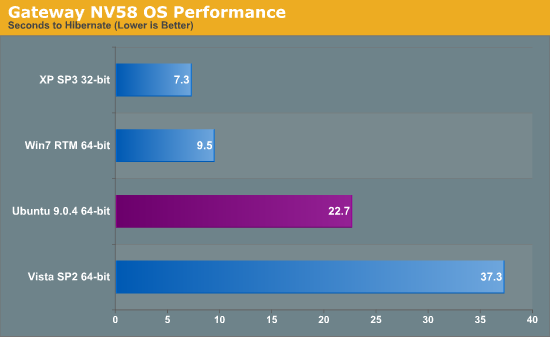
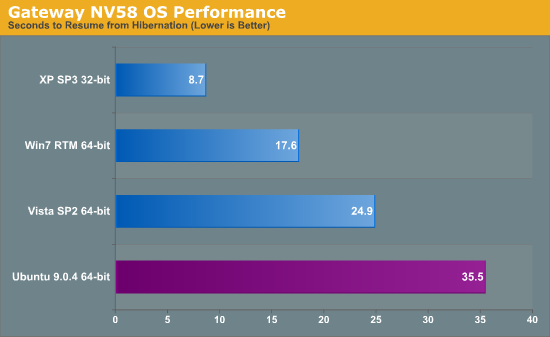
As expected, Windows XP leads in hibernate/resume times since it doesn't have to deal with as large of a hibernation file. Windows 7 trails XP in hibernate times by 30%, correlating very well with the difference in addressable memory. Ubuntu is in third place, requiring over three times as long to hibernate as XP (211% longer). The Vista result is the worst by far, taking 411% longer than XP. There's again the question of whether drivers are somehow at fault, but whatever the cause the NV58 took substantially longer to hibernate on Vista every single time. Resume times don't change the standings much, except Windows XP holds an even larger lead and takes less than half as long as the next closest competitor, Windows 7, which requires 102% more time. Windows Vista doesn't do as poorly in the resume times, though it still trails XP by 186%. Ubuntu is in last place taking just over four times as long to resume as XP, but again the 10 second GRUB penalty is at play.
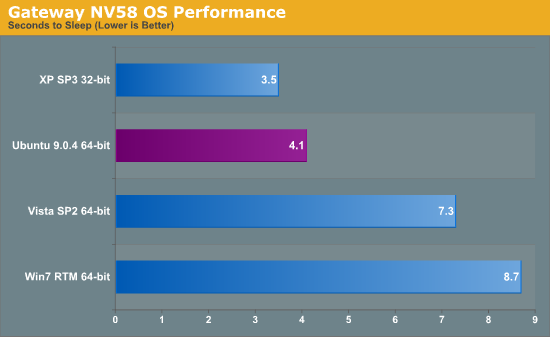
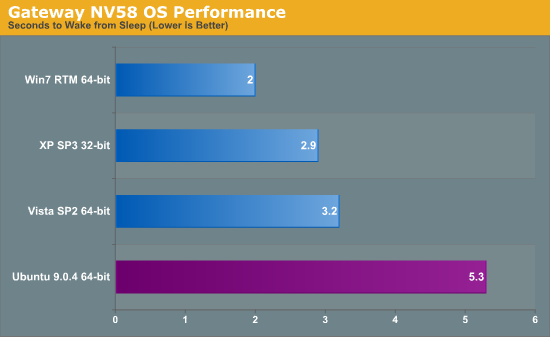
Finally, in sleep times Windows XP again leads, this time followed by Ubuntu which is very close at only 17% longer. Vista takes 109% longer than XP and for once Windows 7 brings up the rear requiring 149% longer than XP to go to sleep. Interestingly, Win7 is the fastest when it comes to waking, requiring just 2 seconds. XP and Vista are 45% and 60% longer, but they're both only around three seconds. Ubuntu is last taking 165% longer than Windows 7, with a result of 5.3 seconds. Since we're dealing with such short times with sleep/wake cycles, the raw percentages and charts aren't nearly as meaningful. As mentioned before, Ubuntu and Win7 tend to be a little more consistent, whereas the best-case results for XP and Vista can be an order of magnitude faster than the worst-case results. If nothing else, Ubuntu is very consistent at going to sleep in around 5-10 seconds; Windows 7 sleep times range from just under 9 seconds up to around 30 seconds, and XP and Vista can take over a minute to go to sleep at times. The difference between 5 seconds and 10 seconds is somewhat annoying, but it's not a huge issue unless you're putting your system to sleep constantly. Occasional delays of over a minute on the other hand can be truly frustrating. For what it's worth, toss in an SSD and the sleep/wake times all appear to be far more consistent (though we didn't conduct in-depth testing on either of these notebooks with SSDs).










106 Comments
View All Comments
orionmgomg - Tuesday, September 22, 2009 - link
You are right - I did shouldn't have been so brass on saying who cares - it is a very well written artical and I am sure you spent a lot of time puttinmg together very accurate data for the people who actually do care.Sorry for being thoughtless to say the least.
I always love anandtech and I love all the articals and the diversity of reviews and studies.
I just had a knee reaction to this because every time I buy a lappy - and test the battery for the first time, I realize - yes battery performance gets better and better - even though ever so slightly, but I also realize with great frustration that you really can not rely on battery power for the most part - it will get you out of a jam for sure - but to base any computing time on battery power is futile - that has been my expreiance and so I made those comments more out of my own frustration than anything...
Thank you for all the hard work, good articals and being the very best tech web site!
Fox5 - Tuesday, September 22, 2009 - link
Ubuntu may be released on a 6 month time frame, but by the time a version comes out, the software in it is 6 months out of date. Since Linux is finally getting some real development attention, it's advancing very quickly, and being 6 months to a year out of date represents a large change in features.Hold off on any future Ubuntu comparisons until Ubuntu 9.10 (fresh install only). It switches to the ext4 file system which fixes some firefox performance issues and should decrease boot times as well and should have more up to date drivers. It's also the next long-term release I believe, which is kind of scary considering how much new stuff they're adopting in that version.
I'm surprised you couldn't get the latest ATI proprietary driver installed though. I've used both ATI and nvidia cards in linux, and ati by far had the easier install process. If I recall, it was as simple as sudo ./atiinstaller and then hitting enter a few times. Then again, I've also heard ati integrated chipsets have horrible driver support under linux, so they may not be supported, though I'd think the hd3200 igp would be since it's still fairly recent.
The intel drivers may also get a big boost in ubuntu 9.10. There's some new video driver (or just 3d?) framework being introduced and the older Intel drivers have all but been abandoned to work on the new framework, so a lot of issues that need fixing aren't even being considered for the current drivers in use.
themissinglint - Tuesday, September 22, 2009 - link
This reads like you guys don't know your way around GNU Linux systems well enough to get what you could out of them. It reads like you did the minimum to get it running, which is, from a perspective, fair, since that was probably more work than you put into the Windows OSs.It's also a small sample because you're only using one/two set ups. Laptops like these are optimized up and down for Windows. Of course that is also true for most computers people buy.
Overall, I am glad to see Ubuntu included at all-- it's usually absent from these sorts of tests. The more you include it, the more experience AnandTech will have running Ubuntu (and other Linux systems), and the more you'll be able to get from it. Also, Ubuntu in particular is quickly becoming more out-of-the-box (as more and more people contribute to development on more and more machines). In the next couple years you'll be testing Linux systems that will blow Windows away in some places.
But: Kudos on including Ubuntu... where's OS X? Couldn't you get it to run on a Gateway machine?
JarredWalton - Tuesday, September 22, 2009 - link
Not going to try OS X on a hackintosh... at least not yet. As for the ATI drivers, I went through the manual install procedure multiple times and was greeted with a failed driver message. It was so bad that I couldn't even get back to the original Ubuntu ATI fglxr driver and ended up just going back to my previous Ubuntu image. I did it three times following various instructions and it failed each time. :(If someone has specific experience with getting an optimized driver for the HD 3200 working, point me at some instructions. The experience right now unfortunately was horrible. All the DVD playback programs I tried on Ubuntu crashed when using the latest "stable Ubuntu Jaunty" driver package, sometimes after five minutes, sometimes after 60 minutes. If you weren't at the PC when the DVD playback froze up, the system would eventually enter a completely locked up state (a la the lovely BSOD, but with no error message).
I still have the laptops and will test out other options if any of you want to point me to guides that are of reasonable quality. I got just a brief glimpse of what Ryan experienced over the past year with Ubuntu, though, and I didn't want to get sucked in any further. I have plenty of other reviews I need to get done!
smitty3268 - Tuesday, September 22, 2009 - link
I think that crash during video playback is fixed by turning off redirected rendering when full screen apps are active (it's an option in Compiz somewhere). Or you could just turn off desktop compositing completely. It seems like the newer drivers have fixed that, but I'm not running fglrx and I don't remember for sure.Fox5 - Tuesday, September 22, 2009 - link
Agreed, the desktop effects, besides wasting battery life, interfere with the ATI's drivers video acceleration and should have been off during the test.Of course, you could then ask why Ubuntu enables something buggy by default.
JarredWalton - Tuesday, September 22, 2009 - link
I did disable Visual FX on both systems - is that the same thing? The ATI setup was pretty much a complete no-show with DVD playback before I did that. It would stutter and fail withing seconds. Sorry I didn't mention that.nofumble62 - Tuesday, September 22, 2009 - link
Intel battery life at least 1 hour longer.AMD boot up time 50% longer.
Those are the two most important things for me.
jodomcfatty - Tuesday, September 22, 2009 - link
If you look at the specs, he's comparing a Intel 4500 graphics chip with an AMD 3200HD(which while integrated, will seriously destroy the 4500 in gaming tests) but that will ALSO completely affect battery life since it can't just be turned down to 4500 usage levels. This thing alone eats up significant battery power while expelling a lot more heat.He did this before and I completely lose respect for him for talking battery life while using totally different setups.
I would agree that equal systems the Intel will most likely be better, but no where near by this much.
This article is more about the OS but even there he knows little about linux but I will say he's willing to do more testing....just seems crazy to me that he couldn't just get a AMD with a 4500(harder to find but not impossible)
JarredWalton - Tuesday, September 22, 2009 - link
What's a better IGP for AMD than the HD 3200? You're being completely obstinate to suggest that it's not a fair comparison.The fact is, AMD can't do any better power-wise than what I've got in the Gateway, can it? An X1270 IGP is similar in performance to the 4500MHD, and power draw is similar to the HD 3200 (because it's on an older process).
As for finding an AMD setup with a 4500, either you're talking about an AMD HD 4500, which would be even WORSE on power draw than the HD 3200, or you're suggesting it's possible to run an AMD CPU with an Intel chipset. It's not, as HyperTransport isn't an Intel feature and that's what AMD CPUs use.